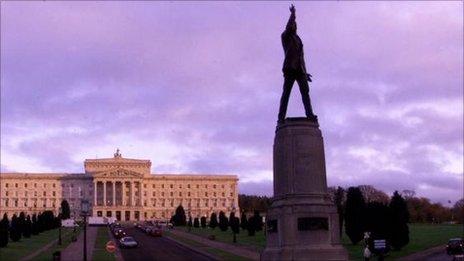Oscar Wilde's grandson looks back on the case that ruined him
- Published

Edward Carson (left) and Oscar Wilde both attended Trinity College in Dublin
Did Edward Carson destroy Oscar Wilde?
In a new documentary set to screen on BBC NI, Wilde's grandson Merlin Holland asks if Carson deserves the reputation as the man who took down his grandfather.
In 1895, Wilde fought a duel in court with a lawyer who he had once called an "old friend".
The lawyer was Carson, a fellow Dubliner Wilde knew from Trinity College Dublin, and it was the most scandalous case of Victorian times.
It ended in Wilde's ruin and led to his imprisonment for his homosexuality, which was a criminal offence in Britain until 1967.
2021 is the centenary of Northern Ireland and Carson's statue at Stormont is a Belfast landmark.
But, like Wilde, Carson was a Dubliner.
They were both born in the same year. They went to Trinity College where they knew each other well.
Yet they were fated to meet in a cataclysmic clash years later in the most famous court in England, the Old Bailey.
The film is a deeply personal journey by Merlin Holland.
'Just doing his job'
The result of the trial was disastrous for the Wilde family.
After Wilde's imprisonment, his wife Constance (Merlin's grandmother) left England with their children and changed their surname to Holland to try to protect them.
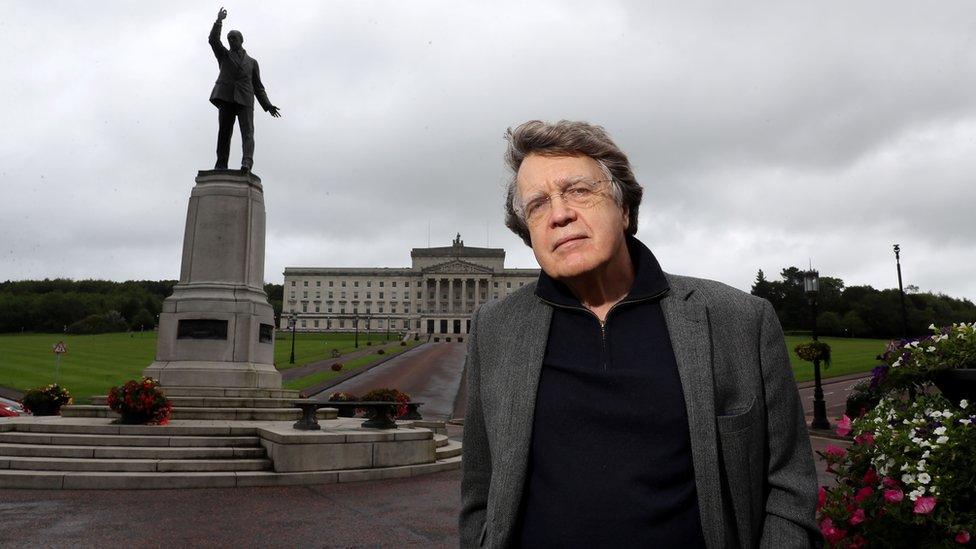
Merlin Holland at the statue of Edward Carson
Yet Merlin surprisingly bears no animosity towards Carson for his part in his grandfather's ruin. He maintains that "Carson was a lawyer who was just doing his job".
In the film, Merlin, who lives in Burgundy, in France, travels to Belfast and visits Carson's tomb in St Anne's Cathedral.
From there, he travels to Dublin, Oxford, and London. His epic voyage finishes in Paris where Wilde lived out his last days and died in poverty in 1900.
The film unearths some surprising new revelations about Wilde's final days in the French capital.
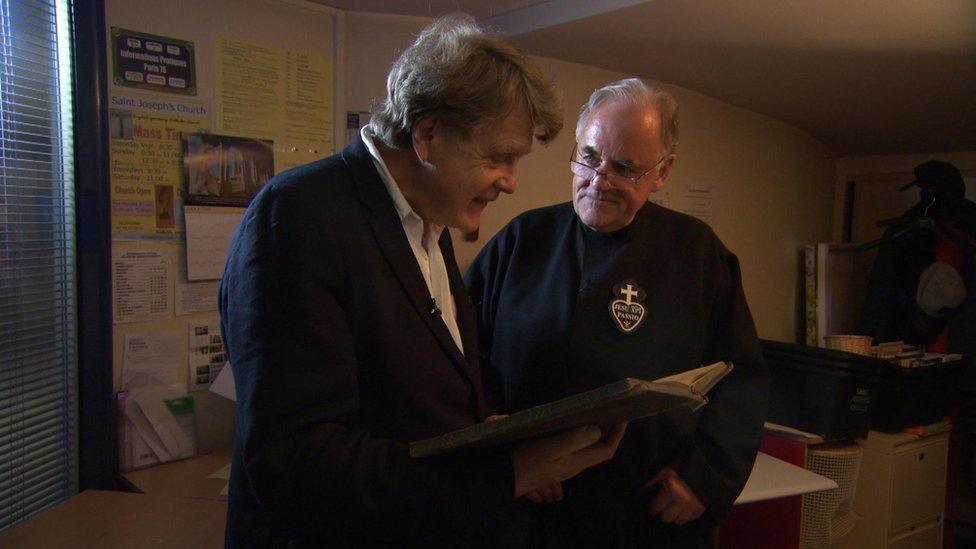
Merlin Holland with Fr Aidan Troy
The written record of Wilde's conversion to Catholicism on his death bed is seen for the first time on camera.
This came about by a remarkably fortunate set of circumstances.
Director Jim Creagh's brother, Fr Kieron Creagh, is a priest of the Passionist Order and he revealed that they kept the record of conversions in Saint Joseph's Church in Paris.
In the film, Merlin is shown the entry in the book which bears witness to Wilde being received into the Catholic Church and his death the following day.
The Paris segment ends poignantly in Père Lachaise Cemetery where his tomb has become a shrine. Fans still come from all around the world to kiss his grave.
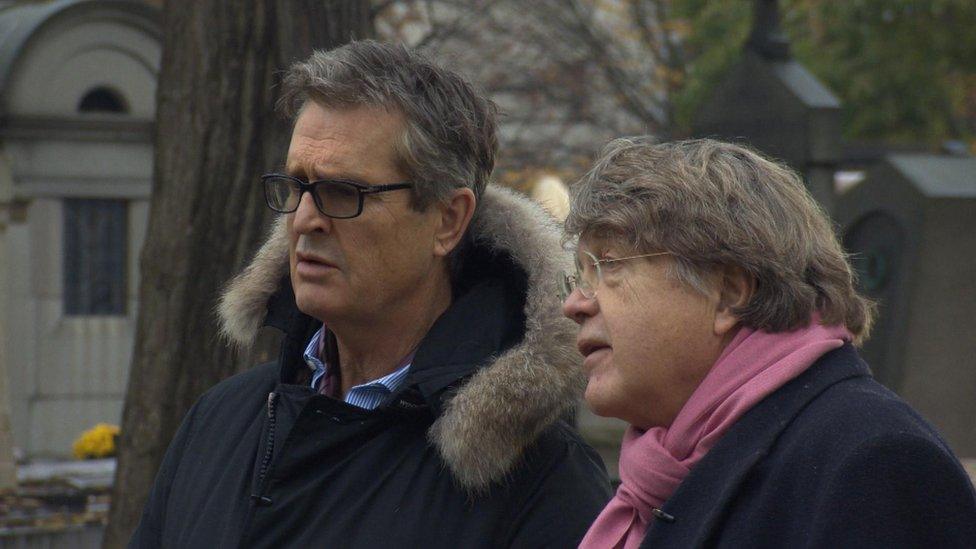
Rupert Everett, pictured with Merlin Holland, played Oscar Wilde in a film
The film features a star cast, which includes contributions from actors Simon Callow and Rupert Everett who played Oscar Wilde in his own film The Happy Prince.
Other contributors include Gyles Brandreth, who is president of the Oscar Wilde Society, and Professor Alvin Jackson, an expert on the life of Edward Carson.
The film is a Hole in the Wall Gang production and was directed and filmed by Jim Creagh.
'Worth the wait'
For me, as producer, it has been a lifelong ambition to bring this to the screen - it took eight years to get commissioned and three years to make. However, I feel it was well worth the wait.
It has been a great pleasure and privilege to work with Merlin Holland.
The film is unique because it is the only documentary that is led by a direct descendant of Wilde.
It is also ground breaking in telling the fascinating story on screen of Carson and Wilde.
I think this film will appeal to fans of Wilde but also those who love history and who will be hooked by the story of these two famous Dubliners.
I also hope it will also attract viewers who know very little about Wilde or Carson but who will be curious to find out more.
Edward Carson And The Fall Of Oscar Wilde is available on BBC iPlayer from Friday, 22 January, as part of BBC Northern Ireland's Season Of Arts, and will also be broadcast on BBC One Northern Ireland, Monday 1 February at 22:45 GMT.
Related topics
- Published6 January 2013
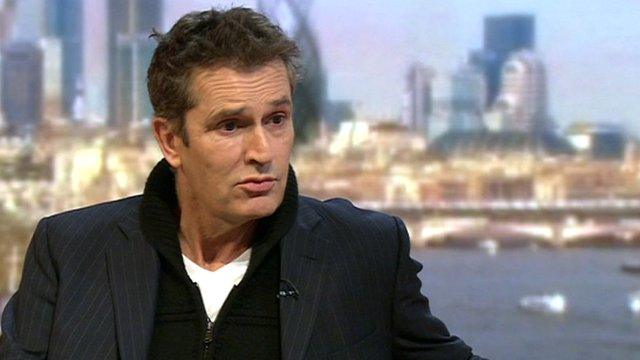
- Published30 November 2011
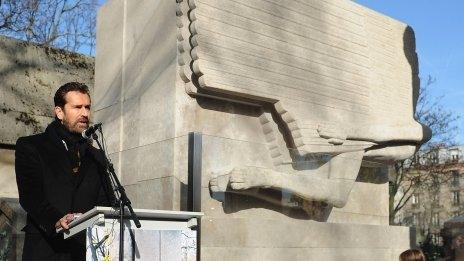
- Published18 April 2011
